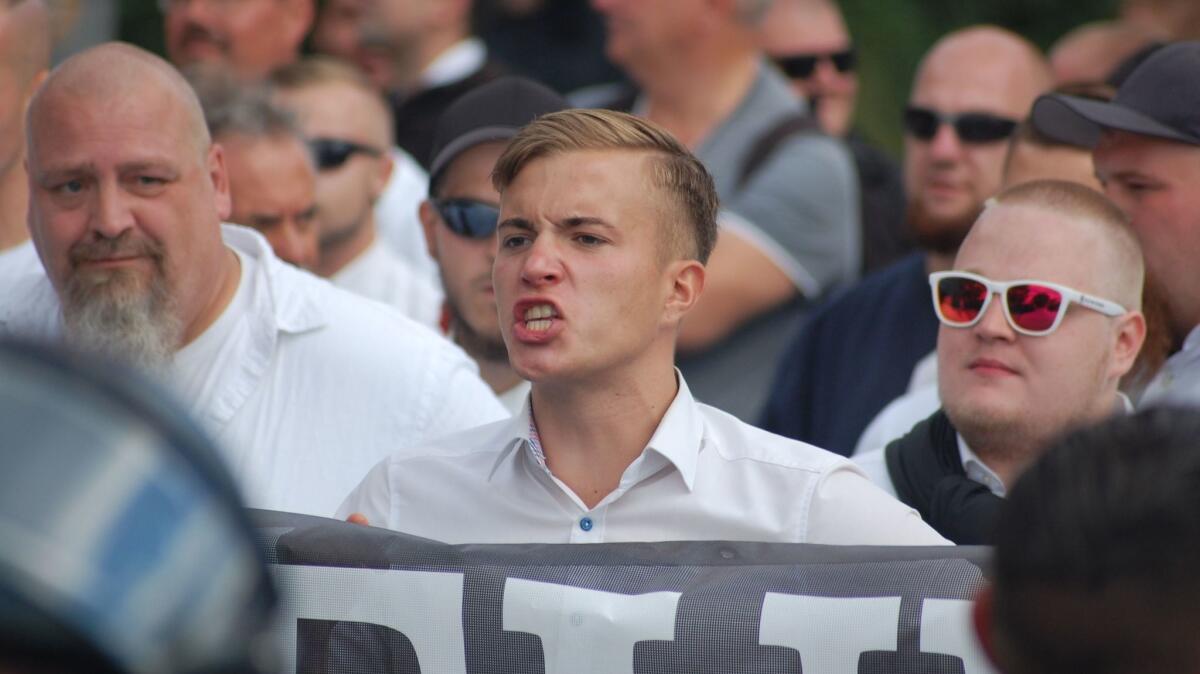Op-Ed: Don’t blame Angela Merkel for the rise of the right in Germany

The emergence of the radical, nationalistic Alternative for Germany party as the third-strongest contender in federal elections Sunday is creating consternation not only in Germany but also abroad.
“They are here,” read an ominous headline on the cover of the magazine Der Spiegel, which features the right-wing party’s leaders, Alexander Gauland and Alice Weidel, looming over Chancellor Angela Merkel, despite her reelection to a fourth (and final) term. The AfD rode to victory by attacking Islam and immigrants, decrying multiculturalism, denouncing the European Union and advocating closer ties with Russia. (Russia reciprocated by using Twitter bots to boost the party’s electoral fortunes.) Immediately after the election, a jubilant Gauland, who maintains that it’s peachy keen to laud the performance of the German army in both world wars, said he wants to “hunt” down Merkel.
As odious as Gauland, Weiland and the AfD’s positions are, the surprising thing isn’t that unabashed nationalists will enter the German Parliament with 94 seats. It’s that it didn’t happen sooner.
It’s easy to blame the radical right’s triumph on Merkel and current events. The chancellor saw her Christian Democratic Union’s share of the vote to decline to 32%, down more than five points from the 2013 election. Her emotional decision in 2015 to admit nearly 1 million refugees from the Middle East and North Africa into Germany aroused deep anger. In 2016, she acknowledged the problem when she said, “No one wants a repeat of last year’s situation.”
Merkel is confronting the greatest challenge of her 12 years in power.
But pinning the blame on Merkel only goes so far. German nationalism is an abiding force that had been artificially suppressed for decades but never fully stamped out. It first emerged in Prussia in the early 19th century, and it has been the engine of much of modern Germany’s history.
In the 1800s, many Germans became besotted with the idea of a unified country that would put an end to the welter of small Germanic states and duchies, and for them, nationalism served as a powerful, idealistic force in creating a Teutonic nation that could match — or even surpass — its neighbors, including Russia and France. This kind of liberal nationalism helped to forge a single Germany in 1871, after Chancellor Otto von Bismarck launched and won three successive wars against Denmark, Austria-Hungary and France. Soon anti-Semitism was added to the mix, and German nationalism began to go totally off the rails.
After it was established in 1949, the Bonn republic preached a culture of contrition about the Nazi past. Its legendary first chancellor, Konrad Adenauer, was intent on embedding it in the West, and his slogan was the uber conservative “no experiments.” Nationalism was taboo as were any overt displays of patriotism. Many West Germans even refused to acknowledge their nationality, referring to themselves simply as Europeans.
This was not the case in East Germany, where the Communist Party pretended that it represented a nation victimized by the Nazis and again by the West. There was no admission of guilt for the Holocaust in the East, no attempt to face the full significance of Germany’s past nationalism.
When West Germany swallowed up East Germany in 1989, it was almost inevitable that some form of nationalism would resurface. Shorn of the restraints of the Cold War, when the United States was the sole protector of West Germany, the remade country was free to reach back to older traditions. Now, the demolition job that U.S. President Trump is performing on the transatlantic relationship, which was an integral part of a profoundly cautious West Germany’s identity during the postwar era, is accelerating the trend.
It isn’t surprising that the Alternative for Germany party scored its highest totals in the East — 21.5% of the vote. Only 11% supported it in the West. In the East, far-right AfD agitators like Bjoern Hoecke railed against Islam, Africans and American influence. According to Hoecke, “Our once respected army has deteriorated into a de-gendered and multiculturalized response force in the service of the USA.” The contention is that America deracinated Germans after 1945, reeducating them into passive docility.
Whether the party will be able to sell this kind of claptrap to more of the German public is an unknown. The AfD already is experiencing factional splits. Moderating figures such as party co-chair Frauke Petry have left the fold because of battles with hard-liners. (Petry is moderate only in the context of AfD: She has no patience for the Nazi vocabulary of hatemongers such as Hoecke, but she also has referred to refugees as a “compost heap.”)
Germany’s election results pose two questions: Will Merkel’s continuing popularity — or at least the safety and experience she represents — neutralize the nationalists? Or will a much more assertive Germany start engaging in adventurous political experiments? Merkel is confronting the greatest challenge of her 12 years in power. She must go from hunted to hunter.
Jacob Heilbrunn is the editor of the National Interest.
Follow the Opinion section on Twitter @latimesopinionand Facebook
More to Read
A cure for the common opinion
Get thought-provoking perspectives with our weekly newsletter.
You may occasionally receive promotional content from the Los Angeles Times.










